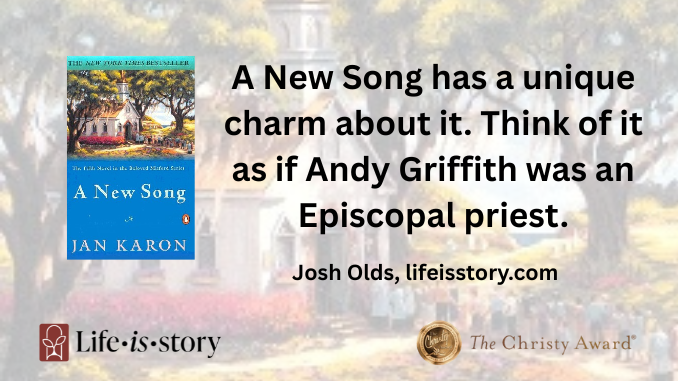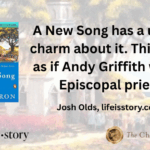
Series: Mitford #5
Published by Viking on January 1, 1999
Genres: Fiction, Christian
Buy on Amazon
Goodreads

In the fifth novel in #1 New York Times bestselling author Jan Karon's beloved series, fans old and new will discover that when it comes to Mitford, absence only make the heart grow fonder...
Mitford’s longtime Episcopal priest, Father Tim, has retired. But new challenges and adventures await when he agrees to serve as interim minister of a small church on Whitecap Island. He and his wife, Cynthia, soon find that Whitecap has its own unforgettable characters: a church organist with a mysterious past, a lovelorn bachelor placing personal ads, a mother battling paralyzing depression. Whitecap has more than its fair share of challenges, but in the end, Father Tim and Cynthia find that Mitford is never far away when circumstances back home keep their phone ringing off the hook...
Review of A New Song by Jan Karon
While A New Song by Jan Karon won the inaugural award for contemporary Christian fiction, that award might as well be for the first five of Jan Karon’s Mitford books. Karon began writing her stories of Father Tim, a humorous and easy-going Episcopal priest in the early 1990s to relatively no acclaim. When At Home in Mitford was published in 1994, sales were minimal but Karon continued with a few more in the series until catching the eye of Viking Press. By the time A New Song released in 1999, Viking had turned Mitford and Father Tim into household names within Christian circles.
A New Song follows the newly and officially retired Father Tim who is leaving the homey and pastoral locale of Mitford for a new adventure—A New Song, if you will—as the interim priest at a small Episcopal church on Whitecap Island. Karon assembles a cadre of memorable and eclectic characters and circumstances surrounding Father Tim that weave between simple and serious and the good priest handles it all with grace and humor to spare. Even though Karon touches on some difficult problems—from mental and physical illness to natural disasters—there’s never any real sense of potential harm as everything ends up happy in the end.
While idyllic and idealistic, it isn’t an altogether inaccurate portrayal of small-town life and the joys and challenges of being a small-town pastor. To the best of my knowledge, Karon never sets a chronological setting for her books and even though this won in the Contemporary category, the books evoke a feeling of mid-20th century America. Think of The Andy Griffith Show but replace the sheriff with an Episcopal priest. A New Song is a bit meandering and lengthy; veers from homey to hokey in a few places; and sometimes reads like a mashup from a Hallmark movie script, a Reader’s Digest story, and a church bulletin. Nonetheless, it’s got a unique charm about it and I see why it was so incredibly popular at the turn of the century.
A New Song by Jan Karon (Viking) beat By the Light of a Thousand Stars by Jamie Langston Turner (Bethany House) and Romey’s Place by James Calvin Schaap (Baker Books) to claim the 2000 Christy Award in Contemporary Fiction. It remains one of the few novels from a mainstream secular publisher to win the award.
Analysis of A New Song by Jan Karon
- Plot Overview
The fifth book in the Mitford Years series, A New Song follows Father Tim Kavanagh after he retires from his longtime ministry in Mitford. Searching for purpose and a new rhythm in life, Father Tim and his wife Cynthia accept a temporary post on Whitecap Island, a small coastal community. The narrative focuses on their adjustment to this new setting, Father Tim’s pastoral work with the island’s eclectic residents, and the deepening of his marriage as they navigate new challenges and joys. - Themes
- Faith and Renewal: Central to the narrative is Father Tim’s spiritual journey. His transition to Whitecap Island is a metaphor for spiritual renewal, illustrating how change can lead to growth.
- Community and Belonging: As in earlier Mitford novels, the story highlights the importance of connection, kindness, and the bonds that form within small communities.
- Aging and Purpose: Father Tim’s retirement prompts reflections on identity and usefulness beyond professional roles.
- Love and Marriage: Cynthia and Tim’s marriage continues to evolve, with moments of intimacy, humor, and shared faith.
- Characters
- Father Timothy Kavanagh: The protagonist, a retired Episcopal priest whose compassionate heart and wry humor shape the story. His inner monologue often blends prayer, scripture, and pastoral reflection.
- Cynthia Kavanagh: Tim’s artistic and spirited wife, providing a counterbalance to his contemplative nature.
- Whitecap Island Residents: A colorful array of islanders, each with quirks, struggles, and spiritual needs that provide the heartwarming vignettes typical of the Mitford series.
- Narrative Voice & Style
Jan Karon employs a third-person omniscient perspective that leans closely toward Father Tim’s thoughts. Her prose is warm, conversational, and infused with humor and biblical allusions. The chapters often alternate between lighthearted everyday moments and deeper, reflective passages. Dialogue plays a major role, capturing the rhythms of small-town and island life. - Structure
The book’s structure is largely episodic, with a series of interconnected scenes and character encounters rather than a tightly linear plot. This approach mirrors real life and allows for extensive character development and thematic exploration. Letters, prayers, and snippets of poetry or scripture appear throughout, adding texture and reinforcing the spiritual atmosphere. - Tone & Atmosphere
The tone is uplifting and contemplative, with an emphasis on hope, grace, and humor. Whitecap Island is depicted vividly, with sensory descriptions of coastal landscapes that contrast the mountain town of Mitford, offering readers a fresh but familiar backdrop.
Spiritual Lessons in A New Song by Jan Karon
- Calling and Purpose Beyond Retirement
Father Tim’s transition to Whitecap Island underscores the idea that God’s calling isn’t limited by age or career status. Evangelical readers will resonate with the message that ministry is not confined to a pulpit—every stage of life is an opportunity to serve and reflect Christ’s love. - The Power of Community and Fellowship
The Whitecap Island setting reinforces the biblical principle of the Church as a body (1 Corinthians 12). Through simple acts of kindness, shared meals, and pastoral care, Father Tim and Cynthia demonstrate that spiritual growth happens within authentic, caring relationships. - Prayer as a Lifestyle
Father Tim’s constant prayers—whether short breath-prayers or more formal intercessions—model the biblical exhortation to “pray without ceasing” (1 Thessalonians 5:17). His reliance on prayer highlights a life of continual dependence on God. - Forgiveness and Grace
Encounters with the island’s residents often bring out themes of brokenness, redemption, and grace. Father Tim’s counsel and compassion illustrate how forgiveness—both giving and receiving—is central to Christian living. - Marriage as Ministry
Tim and Cynthia’s relationship is portrayed as a partnership rooted in faith, prayer, and mutual respect. Their marriage exemplifies how couples can minister together and support each other in fulfilling God’s purposes. - Joy in Simple Living
Karon’s narrative often pauses to reflect on small moments—shared meals, nature, laughter. This reinforces the spiritual lesson of contentment (Philippians 4:11–13), reminding readers that God is present in everyday joys.
People and Places of A New Song by Jan Karon
Father Timothy Kavanagh
- Age: Mid-to-late 60s
- Occupation: Retired Episcopal priest; interim rector on Whitecap Island.
Father Tim is the central figure of the novel, a recently retired Episcopal priest in his mid-to-late 60s. Despite stepping away from full-time ministry in Mitford, he remains deeply pastoral at heart, serving as interim rector at a church on Whitecap Island. His vocation continues to shape his identity—he is a spiritual guide, counselor, and friend to all who cross his path. Father Tim’s reflective nature, humor, and steadfast faith define much of the novel’s tone. His health and advancing age are subtle undercurrents, yet he is portrayed as energetic and eager to find renewed purpose in this new chapter of life.
Whitecap Island
This is the main setting for the novel, where Father Tim and Cynthia spend their temporary assignment. The island is described with a coastal charm—salt air, ocean breezes, and a slower pace of life. It becomes a place of renewal for Father Tim, allowing him to reconnect with both his faith and his pastoral calling. The small-town feel mirrors Mitford but with a distinctive maritime flavor, filled with lighthouses, harbors, and colorful locals.
Mitford
Although most of the action occurs on Whitecap Island, the beloved mountain town of Mitford remains a reference point throughout the novel. It’s the place of Father Tim’s long ministry, rich with friendships and memories, which contrasts with his new environment and highlights the themes of change and continuity.
Favorite Quotes
“He always enjoyed that moment when he could gaze out to his congregation and, as it were, take its pulse, feeling the shared heartbeat of worship and the presence of God.”
“Let the peace of this place surround you as you sit or kneel quietly. Let the hurry and worry of your life fall away. You are God’s child. He loves you and cares for you, and is here with you now and always.”
“Don’t feel totally, personally, irrevocably responsible for everything. That’s my job. Signed, God.”
“Some have been in church all their lives and have never known this mighty, marvelous, and yet simple personal relationship. Others believe that while such a relationship may be possible, it’s not for them—why would God want to bother with them, except from a very great distance? In reality, it is no bother to God at all. He wants this relationship far, far more than you and I want it, and I pray that you will ponder that marvelous truth.”
“We are, finally, all wanderers in search of knowledge. Most of us hold the dream of becoming something better than we are, something larger, richer, in some way more important to the world and ourselves. Too often, the way taken is the wrong way, with too much emphasis on what we want to have, rather than what we wish to become.”
Content Guide
| Content Type | Summary of Warning |
| Violence | Minimal and non-graphic. Contains scenes related to a natural disaster. Occasional references to past hardships or difficult family backgrounds, but no depictions of physical violence. |
| Language | The book maintains a clean and family-friendly tone with no profanity. |
| Sexuality | No explicit or suggestive content. |
| Sensitive Themes | Includes reflections on aging, loneliness, illness, and spiritual struggles. Some characters face emotional wounds or estranged family relationships, but these are handled with hope and grace. |

